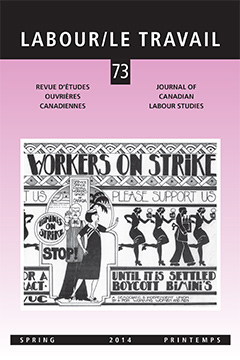An “Entirely Different” Kind of Union: The Service, Office, and Retail Workers’ Union of Canada (SORWUC), 1972–1986
Published 2015-05-19
How to Cite
Abstract
In this article I examine the Service, Office, and Retail Workers’ Union of Canada (SORWUC), an independent, grassroots, socialist-feminist union that organized workers in unorganized industries in Canada in the 1970s and 1980s. I look at SORWUC’s role in Canadian labour history in general, and its efforts to organize workers in the service industry in particular. My central thesis is that SORWUC’s socialist-feminist unionism and commitment to organizing unorganized workers positioned the union as radically different from the mainstream labour movement. This difference both helped and hindered the union. Specifically, SORWUC’s experiences organizing workers at Bimini pub and Muckamuck restaurant in British Columbia demonstrate that although its alternative structure and strategies aided organizing and strike efforts, these factors made little difference in the union’s dealings with the labour relations boards and the courts: in both cases, the action or inaction of the state ultimately determined the outcome. Although SORWUC no longer exists, it remains an important historical example of how workers in Canada have been and can be organized. SORWUC thus offers important lessons about service worker organizing, alternative forms of unionization, and the powerful role of the state in labour relations in the postwar period.
Dans cet article, j’examine le Syndicat canadien des employés de service, de bureau et de détail (SORWUC), un syndicat socialiste-féministe indépendant qui organisait des travailleurs dans les industries non syndiquées au Canada dans les années 1970 et 1980. Je regarde le rôle du SORWUC dans l’histoire du travail canadien en général, et ses efforts pour organiser les travailleurs dans le secteur des services en particulier. Ma thèse centrale est que le syndicalisme socialiste-féministe du SORWUC et son engagement d’organiser les travailleurs non syndiqués a positionné le syndicat comme radicalement différent du mouvement syndical traditionnel. Cette différence a à la fois aidé et gêné le syndicat. Plus précisément, les expériences du SORWUC d’organiser les travailleurs au pub Bimini et au restaurant Muckamuck en Colombie-Britannique démontrent que, bien que sa structure et ses stratégies alternatives ont aidé les efforts d’organisation et de grève, ces facteurs ont fait peu de différence dans les relations du syndicat avec les commissions des relations de travail et les tribunaux : dans les deux cas, l’action ou l’inaction de l’Etat en fin de compte a déterminé le résultat. Bien que le SORWUC n’existe plus, il reste un exemple historique important de la façon dont les travailleurs au Canada ont été et peuvent être organisés. Le SORWUC offre donc d’importantes leçons sur l’organisation de travail de service, d’autres formes de syndicalisation, et le rôle important de l’Etat dans les relations de travail dans la période d’après-guerre.
